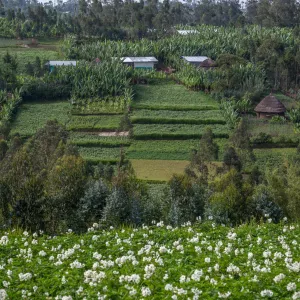Global environmental experts to converge at Tropentag 2025 to forge sustainable futures for tropical landscapes
As part of the Tropentag 2025 conference, a pivotal workshop on 10 September 2025 will bring together a diverse coalition of international experts to tackle one of the most pressing challenges of our time: reconciling the changing use of land with the health of our planet. The session from 09:00 – 12:00 (CEST), titled “Enhancing tropical landscape multifunctionality, resilience, adaptability

Global environmental experts to converge at Tropentag 2025 to forge sustainable futures for tropical landscapes
As part of the Tropentag 2025 conference, a pivotal workshop on 10 September 2025 will bring together a diverse coalition of international experts to tackle one of the most pressing challenges of our time: reconciling the changing use of land with the health of our planet.
The session from 09:00 – 12:00 (CEST), titled “Enhancing tropical landscape multifunctionality, resilience, adaptability and health through socio-ecological gains: A knowledge exchange,” aims to foster collaboration and identify critical intervention points to support both ecosystems and human needs. Specifically, the overall goal is to share experiences in co-developing context-specific, and inclusive land use strategies that enhance socio-ecological resilience, adaptability and multifunctionality in tropical landscapes through integrated bundles of biophysical and social innovations.
The workshop is organized by CGIAR’s Multifunctional Landscapes Science Program, in collaboration with the Global Landscapes Forum (GLF), the United Nations Convention to Combat Desertification (UNCCD), GIZ, and the University of Marburg.
From case studies to collaborative action
The session will kick off with a keynote address from Barron Joseph Orr of the UNCCD, who will offer a global perspective on land degradation neutrality. Following the keynote, the workshop will dive into a series of six dynamic case study presentations, showcasing tested and emerging approaches from around the globe.
These case studies will provide concrete examples of innovation in action. For instance, Mark Schauer from the Economics of Land Degradation Initiative (GIZ) will present on using economic arguments to drive investment in multifunctional landscapes. Björn Vollan of the University of Marburg will share insights from the Bogotá Citizens’ Juries, demonstrating how “when diverse citizens deliberate with good information and real influence, they can co-create legitimate, actionable solutions”. Other presentations will cover topics from the political economy of agroecology to participatory transition pathways in “Living Labs“.
The event emphasizes an interactive and inclusive format. After the initial presentations, the workshop will shift into a “Fishbowl” conversation, a structured dialogue designed to encourage participation from everyone in the room—both in-person and online. This segment will focus on identifying key research priorities and exploring how local actors can be better equipped with the financing, capacity, and policy support needed to lead sustainable change.

Forging a path forward
The workshop is designed to produce tangible results. Organizers aim to leave the session with several key outcomes, including:
- A collection of systems-thinking approaches and practical lessons on multifunctional landscapes.
- An expanded GLF community of practice for joint action and capacity sharing.
- Co-identified research priorities and innovation pathways to bridge the gap between science and policy.
Perhaps the most significant outcome will be the initiation of a collaborative white paper on pathways to enhance tropical landscapes. This document is slated to be finalized ahead of major upcoming global environmental summits, COP-30 and UNEA-7, ensuring the workshop’s findings can directly inform international policy.
By sharing success stories and defining a clear plan of action, the workshop aims to strengthen collaboration and accelerate the adoption of inclusive, nature-positive solutions for the world’s vital tropical regions.


